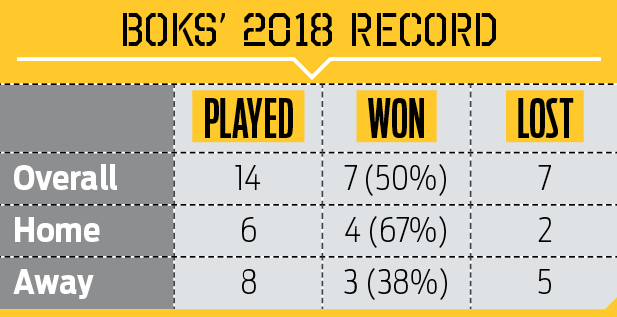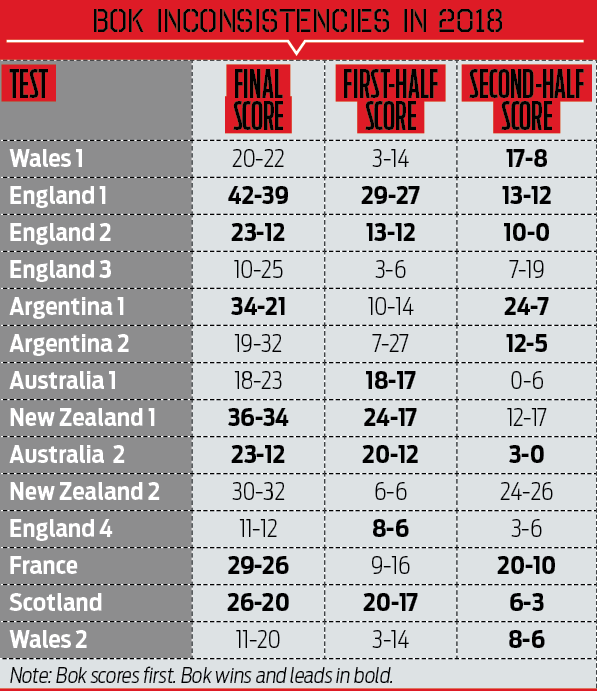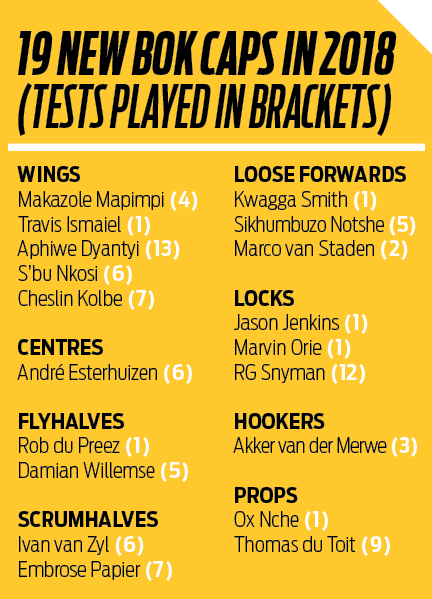JON CARDINELLI rates Rassie Erasmus’ Springboks in terms of results, player development, game plan execution and transformation.
RESULTS (6/10)
The South African rugby public expects more from the Springboks than a two-from-four return in the northern hemisphere. It expects the national side to win more than 50% of its Tests over the course of a season and to sit higher than fifth in the World Rugby rankings.
Rugby fans would do well to remember 2016 and 2017, though. Under Allister Coetzee, the Boks suffered historic losses to Ireland, Argentina and Italy. They copped record hidings at the hands of the All Blacks (conceding more than 50 points at home and away), Wales and Ireland. The Boks’ ranking at the end of Coetzee’s tenure – a record low of seventh – confirmed that the team had hit rock bottom.
All this needs to be kept in mind when assessing the state of South African rugby after Erasmus’ first year in charge. Where Coetzee sought temporary solutions to plug the leaks and keep an outdated ship afloat, Erasmus has endeavoured to build a more modern vehicle that can close the gap between South Africa and the better Test teams. The performances in 2018, and indeed some monumental individual results, should be viewed as evidence that the Boks are heading in the right direction.
In 2017, critics at home and abroad denounced the Bok side as one of the worst South African outfits in history. Many lamented the loss of a once fearsome physical reputation. In the wake of the series victory against England in June 2018, however, coach Eddie Jones lauded the resurgence under Erasmus and felt that the team would travel to the 2019 World Cup as genuine title contenders.
Erasmus was right to brush such plaudits aside. The Boks went on to lose by 15 points against England at Newlands and by a record 13 points against Argentina in Mendoza. Those were disappointing results in isolation, and perhaps highlighted the immaturity of the side. That said, the fact the Boks were lamenting 15- and 13-point defeats rather than 57- and 35-point massacres (as was the case when they faced the All Blacks and Ireland in 2017) suggested some progress had been made.
Former Bok coach Nick Mallett said the team would do exceptionally well to lose to the All Blacks by 10 points or fewer in Wellington. The Boks went on to win that match 36-34 and end a nine-year drought in New Zealand.
Suddenly all and sundry expected the Boks to beat the All Blacks in the next clash in Pretoria. They were criticised for relinquishing a big lead and losing 32-30 at the death. The most telling statement in the aftermath, though, was made by Steve Hansen. The All Blacks coach declared that the famous New Zealand-South Africa rivalry was alive and well, and the Boks were back.
The Boks played well in patches on their four-Test tour of Europe. They dominated for much of the contest against England at Twickenham, and may have won at the death if Owen Farrell had been penalised for a shoulder charge on André Esterhuizen. Wales outplayed them in Cardiff, though, and Erasmus admitted afterwards that it was the worst Bok performance of the season.
The 50% win record confirms the Boks still have room for improvement. They deserve an extra rating point, however, for becoming the first nation to win in New Zealand since 2009.
GAME PLAN AND EXECUTION (6/10)
There were some bright moments on attack, a record five tries scored against the All Blacks in New Zealand serving to highlight the side’s shift in mindset. Jacques Nienaber’s return to the coaching set-up led to a remarkable change on defence – one of the side’s problem areas in 2016 and 2017. Improvements were made in other key departments, like conditioning. All that said, the results and some of the stats in the sidebar below confirm that this Bok side is far from the finished article.
One cannot fault the Boks for their intent and tactical approach. Their execution and composure, however, cost them at crucial moments in certain Tests. While Erasmus and company should be granted some leeway as they develop a wider squad and rebuild the structures, these inconsistencies cannot be tolerated indefinitely.
The loss to Wales in Washington DC was written off to inexperience. A poor start cost a second-string Bok side on that occasion. The 1st XV started the series against England in the worst possible fashion. Somehow they bounced back from a 21-point deficit to lead 29-27 at half-time. They wobbled again in the second stanza, but managed to finish on the right side of the result. They trailed 12-0 during the early stages of the second Test against England, but fought back to lead 13-12 at the break. A stronger showing in the latter stages allowed them to close out the match and secure the series.
And so it continued. Argentina led 14-10 in the Rugby Championship opener in Durban. The Boks came out firing in the second half, and finished the game with six tries and a bonus point. They were less impressive during the second stanza of the Test in Australia, scoring zero points.
Some might say that a win in New Zealand requires no critical analysis, and yet something should be read into the fact the Boks went down 12-0 in the first quarter. They fought back to lead 24-17 at half-time, but were outscored 17-12 in the second period. A second-half slump, as well as some injury-enforced substitutions, contributed to the Boks’ defeat to New Zealand in Pretoria. The hosts conceded 26 points in the final half hour to lose 32-30.
The Boks troubled England throughout the first half of the game at Twickenham. Despite their physical dominance, and the fact Maro Itoje was in the sin bin for 10 minutes, the Boks only managed to lead 8-6 at the break. Their second-half effort amounted to one penalty goal, and in the end that proved insufficient.
The Boks should be applauded for how they fought back in Paris, first when they were 23-9 down early in the second half, and again during stoppage time. The performance as a whole, however, confirmed that the game management required work. This was again apparent when they conceded two early tries against Wales and went on to lose 20-11 in Cardiff.
The coaches and senior players deserve high marks for developing a game plan that can put the best sides under pressure. However, the Boks will need to sharpen their attack and eradicate those defensive lapses if they hope to finish on the right side of a tight scoreline at the 2019 World Cup.
PLAYER DEVELOPMENT (8/10)
Erasmus promised to cast the net wide at the beginning of the season. He said he would experiment with different players and new combinations with a view to the 2019 World Cup and beyond. The Bok coach proved a man of his word on this point, when one considers that 19 players made their Test debuts over the course of the season.
Erasmus opted to field a side comprising second- and third-choice players in the season-opener against Wales in Washington DC. Logistically speaking, it was the wisest course of action. The first-choice players were kept in camp in Johannesburg to prepare for the first match of the series against England – which was scheduled seven days after the game in the far-flung US.
Six of the players who made their debuts in Washington DC didn’t feature again for the Boks in 2018. Erasmus showed his intent, though, when he backed several inexperienced players over the course of the series against England, in the Rugby Championship, and on the end-of-year tour to Europe.
A few of those players were backed to start on a consistent basis. Aphiwe Dyantyi – who only made his Super Rugby debut in 2018 – started all 13 Tests for the ‘first-choice’ Bok side. The wing made a remarkable impact and was subsequently named World Rugby’s Breakthrough Player of the Year. Other rookies like RG Snyman (12 Tests) and Thomas du Toit (nine) enjoyed plenty of game time and made some telling contributions.
Erasmus came in for some criticism regarding his management of two youngsters in Embrose Papier and Damian Willemse. Again, one needs to acknowledge that the coach was bold enough to bring Papier into the mix despite the player’s inexperience. The 21-year-old scrumhalf made his Super Rugby debut for the Bulls earlier in the season, and started only three matches for the Pretoria-based franchise. While he didn’t receive much game time initially, he was backed to start against Scotland and Wales.
Erasmus was upfront about his plan to use Willemse at flyhalf and fullback at the 2019 World Cup. The 20-year-old made his debut off the bench against Argentina at flyhalf, but was backed to start at fullback against England at Twickenham. Papier and Willemse – who weren’t on the Bok radar a year ago – now look set to travel to the global tournament in Japan.
In the buildup to the Test season, Erasmus told SA Rugby magazine that he would only consider overseas-based players who possessed something their South Africa-based counterparts lacked. Duane Vermeulen made an impact as a player and leader in the series against England, and on the end-of-year tour. The decision to recall Faf de Klerk and Willie le Roux – two players who moved to England after being discarded by the former Bok coach in 2017 – made all the difference to the team’s attack.
Cheslin Kolbe, Francois Louw and Vincent Koch made some important contributions at the back end of the season. While the media and public questioned the selection of Schalk Brits – who had retired at the end of the 2017-18 northern hemisphere season – the coaches and players felt the 37-year-old veteran had played a crucial mentorship role behind the scenes.
TRANSFORMATION (6/10)
It’s unfair to talk about the transformation record of the national side without considering how the franchises have fared in this department over the past few years. In the January 2019 issue of SA Rugby magazine, those records are explored in detail and the resultant problems facing the national coach are highlighted.
That said, the 2018 season will be remembered as a significant one for transformation at the highest level. Beast Mtawarira became the first black African to play 100 Tests. Siya Kolisi became the first black African to lead the Boks. Six black Africans were included in the starting XV for the first time.
Overall, 21 players of colour were used by Erasmus over the 14 Tests, whereas 16 were used in 2017. It was interesting to note how many black players were considered first choice by the end of 2018. Erasmus hailed Lukhanyo Am as one of the key players in the set-up, even though the outside centre missed the tour to Europe because of injury. Dyantyi and S’bu Nkosi were the preferred wing combination (when Nkosi was fit), while Kolisi and Mtawarira featured regularly upfront. One would expect to see these players starting at the next World Cup. Others who had a chance to grow and develop in 2018 – such as Bongi Mbonambi, Elton Jantjies, Papier and Willemse – should be in the match 23 next season.
The Boks have failed to hit the target set out by SA Rugby in recent years, finishing with an average black player representation of 39% in 2017 and 2018. One wonders how the team will reach the 50% target that has been set for the 2019 World Cup.
Erasmus backed a black captain and as many as seven players of colour in the starting XV for that massively important fixture against England in Johannesburg. That was effectively the first match of his tenure. He needed to make a statement with his selections but he also needed a win. The side was not as transformed in the Rugby Championship, though, with only four black players starting in the big games against New Zealand.
Again, the Boks’ struggles to transform must be linked with the respective franchises’ struggles to transform. It may be some time yet before they reach the 50% target, and until then, the rating will remain modest.
What we cannot deny, however, is that 2018 was a big year given all the historic firsts.
FINAL VERDICT: 6/10
– This article first appeared in the January 2019 issue of SA Rugby magazine.








